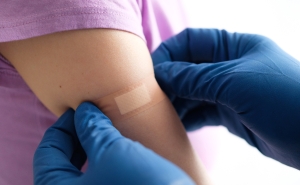The Power of Boosters

Updated June 7, 2022
Even as omicron’s subvariants fuel yet another surge in COVID-19 infections, data show that booster doses have helped avert hospitalizations and severe disease among those who received them. Experts say boosters will continue to play an important role as our COVID-19 response evolves—but the U.S. continues to lag in booster uptake.
Boosters offer broad protection.
The science is clear: Boosters strengthen the immune response—but equally important, they broaden the ability of antibodies to recognize more variants and subvariants. Although omicron managed to evade some of the immunity provoked by the two-dose series of mRNA COVID-19 vaccines, a third dose offered protection similar to that of the original series against earlier variants.
“If you haven't gotten the first booster yet, you should get it,” says virologist Andy Pekosz, PhD, a professor in Molecular Microbiology and Immunology. “Boosting is needed to get the strongest protection against the widest range of variants.”
David Dowdy, MD, PhD ’08, ScM ’02, an associate professor in Epidemiology, agrees: “Boosters were effective before, they are still effective now, they will probably continue to be effective going forward, and I still think it makes sense to get a booster if you haven't gotten one already.”
Yet booster uptake has been disappointing.
The CDC reports that 66.7% of the eligible U.S. population has completed the original vaccination series (two Pfizer-BioNTech or Moderna vaccines, or one J&J/Janssen vaccine), but only 46.9% of that group has gotten a booster dose. Only 23.4% of people ages 50 and up have received the available second booster dose. There are probably many reasons behind this.
“I think that the boosters came out at a time when people were a little less scared about COVID,” Dowdy says.
He adds that the booster messaging may have been less effective compared to the original vaccine campaign and notes that booster mandates have not been widespread.
Even among people 65 and older, a group for whom boosters are critical, 91% are fully vaccinated, yet only 69.7% and 29.6% have received their first and second booster doses, respectively. “It’s well-proven in that age group that a booster keeps people out of the hospital and keeps people from dying,” says Pekosz, “but for some reason it hasn't been accepted as much as that initial vaccination.”
Breakthrough infections have boosting power.
Since omicron came on the scene last fall, the U.S. has built population immunity through both infection and boosters. Both Pekosz and Dowdy say that the level of protection afforded by the original vaccine series—two Pfizer-BioNTech or Moderna vaccines, or one J&J/Janssen vaccine—and a subsequent documented infection of COVID-19 is on par with the enhanced protection of a booster shot.
“For people with intact immune systems, whose body has gotten at least three exposures—a primary vaccine series plus a booster, or primary vaccine series plus an infection, or an infection followed by a vaccine series—those people on average, seem not to be getting all that sick,” says Dowdy.
Pekosz cautions that people who were infected during the omicron surges should get vaccinated if they have not been already. “Omicron infection by itself doesn’t provide as strong or broad an immune response as infection with previous variants did. People who were just infected during omicron may not have as strong an immune response as they think they do and may be more susceptible to reinfection in the future,” he says.
What might the booster future be in 2022?
Part of living with COVID-19 is understanding that existing vaccines don’t provide sterilizing protection (meaning that a vaccine will prevent all infection). “These vaccines have always been very effective against preventing severe illness but not effective in the long term against preventing you from getting reinfected. With new variants, that is still the case,” Dowdy says.
Looking to the fall, Pekosz anticipates “a renewed push, perhaps combined with flu season, to get people boosted.” He also thinks a reformulated booster—one offering longer-lasting protection—may be on the horizon.
“If we are going to start thinking about a long-term immune response that absolutely has to involve boosters. This will boost not just to protect you for six months; it will be a more long-term strategy, where we’re trying to figure out how to induce longer immunity with a more limited number of shots.”
But that shot won’t simply be tweaked for effectiveness against omicron. Instead, Pekosz says, a vaccine based on two variants—a bivalent vaccine—would be more powerful against existing and emerging variants. Changing the timing between boosters may also help provide more long term immunity.
“With SARS-CoV-2, if you immunize with closely related variants, it boosts the broader immunity better. So the formulation and timing of the booster could be very different.”
Jackie Powder is the assistant editor of Hopkins Bloomberg Public Health magazine.





